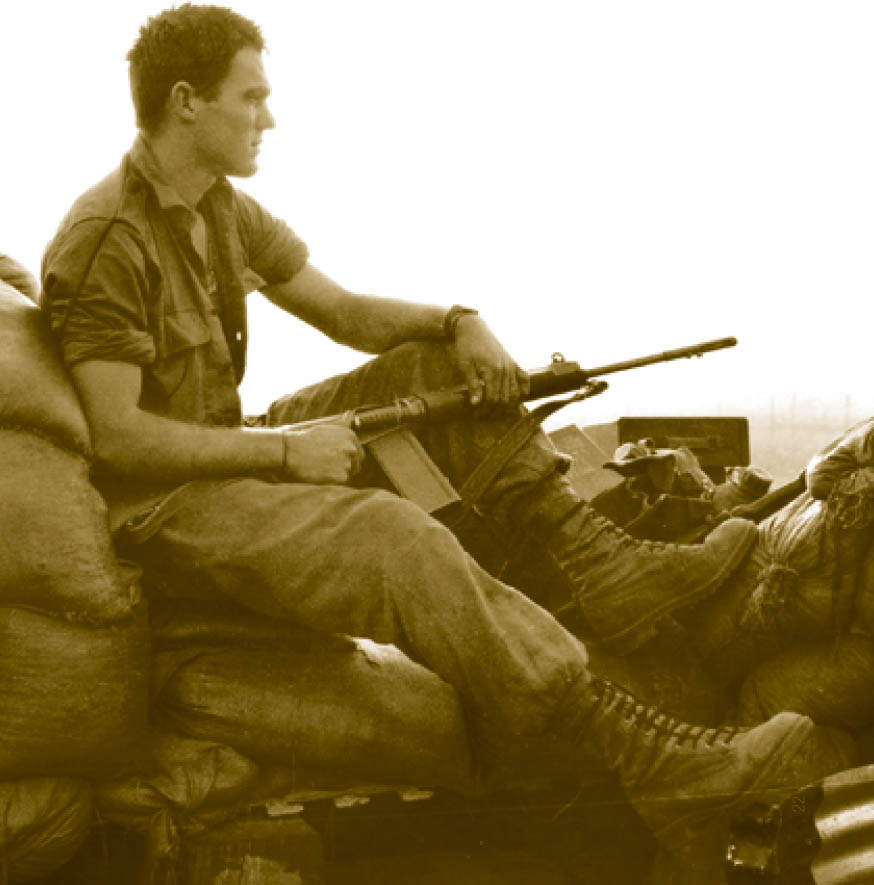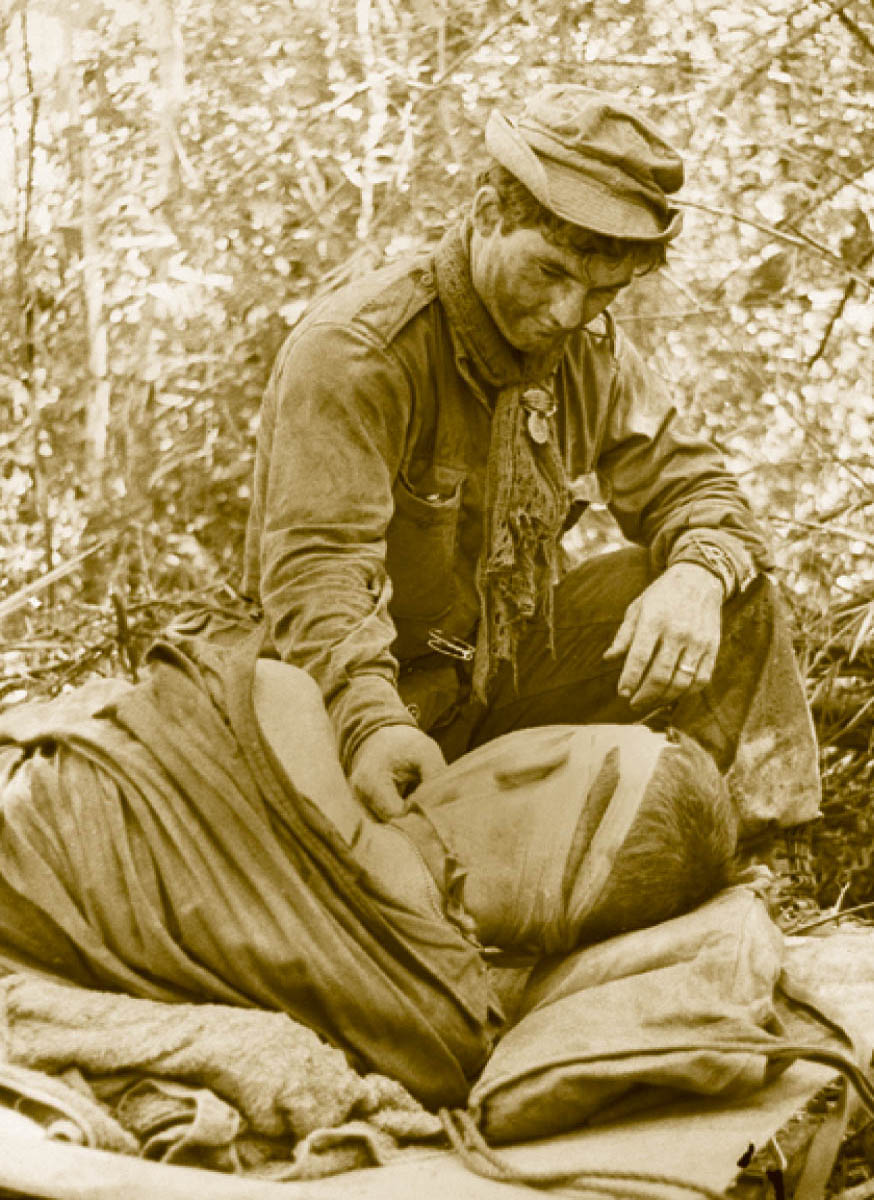
Vietnam Through An Infantryman’s Eyes
by Private Gary McMahon, 6th Battalion, the Royal Australian Regiment, Vietnam
It’s impossible for civilians to comprehend what the average infantryman went through in Vietnam. A General once exploded in sheer frustration to a war correspondent:
“I get so eternally tired of the lack of understanding of what the infantry soldier endures. I get so fighting mad because of the general lack of appreciation of real heroism – which is the uncomplaining acceptance of unendurable conditions.”
“Vietnam” - to the fighting men there, half a world from home, the name meant many things, and none of them were good. It was a long way from those we loved. It was the closest place to death. It was the place where I lost my best friend. It was a place where we all surely, and without doubt, lost what was left of our boyhood.
Vietnam was stagnant rice paddies, red clay, jungle vines, bamboo thickets and elephant grass. It was weeks of 120 degree heat and 100 percent humidity. It was drought and monsoon and flood. It was two seasons: hot and dry and hot and wet, or sometimes both. As a soldier once said, “This is the only place in the world where you can be shoulder deep in mud and have dust blowing in your face at the same time”.
Vietnam was the red ant, the malaria mosquitoes, the bamboo flea and the bamboo viper, the pit viper, the banded krait, the cobra, and a couple of other snakes that go under the alias of “Mr Two Foot” and “One Step Charlie”. Of course they were all poisonous. There were the spiders, flies, lizards, rats, bats, leeches and a million insects and no two were alike. As for illnesses, there were malaria, jungle rot, typhus, fungus, immersion foot, sunburn, dysentery, pneumonia, heat prostration, tuberculosis, leprosy and other ailments we didn’t even have names for.
These were the dangers that lived and thrived there. But so did the spirit of the infantryman. Every day we met the challenges of that cruel, agonising war. We survived. We even triumphed. It didn’t take much to make us happy. We got overjoyed at little comforts like a squirt of insect repellent on a leech eating into our skin or a cigarette that was dry. We did everything that was asked of us and more. We fed on courage selflessness and dedication, and a camaraderie that those who shared it will never find anywhere else again. We got by on the most simple, pathetic but important little pleasures. A sweat stained photo, a letter from home, a night’s sleep in a bed or water free of leeches.
We were young Australians and Americans, who would have given anything to be back home doing other things. But we weren’t. We were in Vietnam doing our duty for our country. By all accounts we were the smartest, strongest, best trained, most spirited and competent fighting men our country had ever sent to war. We were young, but we were old beyond our years because that war was a crash course in maturity and survival. We would do anything for a mate, anything except leave him on the battlefield. We shared our last drops of water and our last cigarettes. We patrolled together, slept together, laughed together and fought together. We even died together. We trusted each other with our lives but we learned to mistrust the slightest movement in the bushes, the snap of a twig at night, the old villager with a concealed hand and the child who appeared young and innocent. We learned to live by our senses and our instincts.
We lived like this because we were up against a tough, resourceful, tenacious and brave enemy we called “Charlie”. Whether he was the local village Viet Cong (VC) we called “Victor Charles” or the main force North Vietnamese Army (NVA), we fought them both, and he was good. He stood about five feet, six inches tall and weighed about eight stone wringing wet, but in my opinion he was one of the best guerrilla fighters in the world. He was a master of camouflage, concealment and surprise. He dug into holes, faded into the jungle, or submerged for hours in a rice paddy breathing through a bamboo tube. He moved a lot at night and was always agonisingly hard to find.
He was deadly and treacherous. He would bury village people alive when they refused to help or pay rice taxes. He would resort to assassination and torture whenever it served him. And he would kill his own wounded to silence them.
We could never relax because he was everywhere. He was sometimes farmer, or civilian or woman or child, and he had many, many tricks: bombs hidden on a woman’s or baby’s body, fruit injected with snake venom, ice for drinks filled with slivers of glass or acid in Coca-Cola. More importantly, he was not afraid to die.
As good as he was so were we, and in my opinion we were better on the battlefield. We fought the enemy at every opportunity and we never lost a battle. It was a strange, bitter, frustrating, personal war. A war of contrasts: of modern technology and primitive conditions; of mud and dust; of outgoing and incoming; of contact and no contact; of hit and near miss. Vietnam was the difference between the body bag and the good war story.
It was a war where you learned to trust in fate or God. There were not many atheists amongst infantrymen in those days….It was that kind of war.

